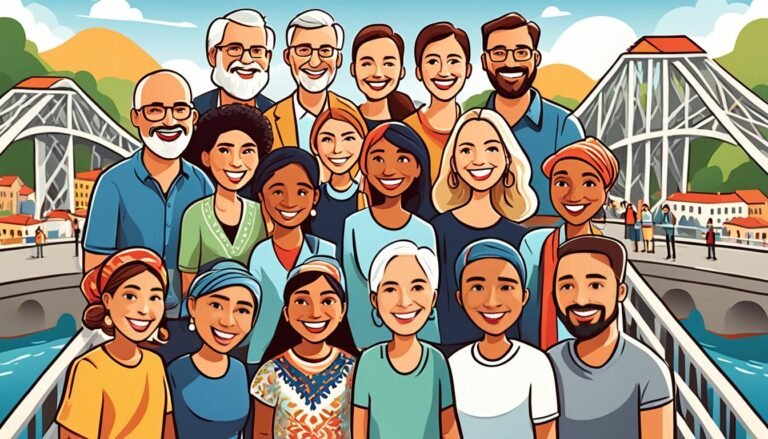Leadership in Social Impact: Driving Change
“The best way to predict the future is to create it.” – Peter Drucker
Social impact leaders drive change for the better in our society. They have a clear vision, understand people’s needs, and lead with strong values. They focus on important social and environmental issues to make the world better for everyone.
In this article, we’re going to look at what makes social impact leaders stand out. We’ll see the positive changes they’ve made and how they work in different areas to make a big impact. We’ll also talk about the role of faith in creating change and give tips on how to make a lasting difference.
Key Takeaways:
- Social impact leaders drive positive change through effective leadership and ethical practices.
- Attributes such as vision, empathy, and collaboration are common among social impact leaders.
- Examples of successful outcomes include transforming education, eradicating diseases, and inspiring climate action.
- Leaders can operate in business, people, and social spheres to make a difference.
- Aligning actions with values, creating inclusive cultures, and using technology are key to driving change and leaving a legacy.
What is a Social Impact Leader?
A social impact leader makes a big difference in our world. They lead their organizations to help society with its needs. They use new ideas to fight poverty, help kids get a better education, and protect our planet.
Being part of CSR is a big deal for these leaders. CSR means companies do good for people, not just make money. These leaders make sure their companies think about how their actions affect society and nature. They work closely with others, like non-profits and governments, to find the best solutions for big issues.
Addressing Social and Environmental Issues
Social impact leaders take on tough problems like poverty, lack of education, poor health, and climate change. They come up with plans to make life better for everyone. This work needs partners from many different areas to succeed.
“Social impact leaders understand that poverty alleviation is critical for creating a more equitable society where everyone has the opportunity to thrive.”
They work to end poverty and help more people get a good education and healthcare. They also care about saving our planet. And they know they can’t do it alone. Working with others is key to their success.
Collaboration and Innovation
These leaders see the value in working together and being creative. They share ideas and resources with others to make a bigger, positive change.
“Social impact leaders collaborate with diverse stakeholders to develop innovative solutions that address social challenges.”
They promote thinking outside the box within their teams. This means trying new tech, looking at data closely, and exploring fresh ideas. They believe this is the path to solving some of our biggest problems.
Adapting to Complex Environments
Social impact leaders deal with a lot of moving parts and changes. They need to understand many different rules and ways of working. This can be tough but they’re up for the challenge.
“Social impact leaders possess the flexibility and adaptability to respond to the complexities of social and environmental issues.”
They keep up with the latest information and trends. This helps them change their plans so they can keep helping people. Staying flexible is how they meet society’s changing needs.
In the end, social impact leaders are key in making our world better. They tackle tough problems, encourage new ideas, and are always ready to change as they learn. With their hard work, we’re walking towards a brighter, fairer future for everyone.
Attributes Commonly Found in the Social Impact Leader
Social impact leaders have special traits that help them make a real difference. These qualities let them bring about positive changes and motivate people around them. Let’s look at what these key traits are.
Empathy and Compassion
These leaders are known for their understanding and caring nature. They listen to and feel for the struggles of others. This makes it easier for them to connect with people and build strong relationships based on trust.
Vision and Purpose
Having a strong vision and purpose sets social impact leaders apart. They deeply know the problems they are fighting. Their vision for a better future inspires not just themselves but others to work towards their goal.
Collaboration
They value working together with others. They know that real change needs everyone’s effort. So, they bring different groups together to make their impact larger and more lasting.
Adaptability and Resilience
They face many different challenges in their work. What makes them successful is their ability to adjust and find new solutions. They never give up and keep moving forward, no matter the obstacles.
Innovative Thinking
Thinking outside the box is part of their skill set. They are always looking for new ways to solve social problems. They are bold and willing to try different, innovative ways to achieve what they have in mind.
Ethical and Integrity-Driven Behavior
For these leaders, being ethical and true to their values is a must. They make decisions that are right for everyone, not just themselves. Their integrity helps them earn trust and respect wherever they go.
Effective Communication
They are great at getting their message across. With their strong communication skills, they can explain their vision in a way that inspires. This helps them gather support and get more people involved in their work.
Combined, these qualities make social impact leaders effective. They don’t just dream of change; they make it happen, leaving a positive mark on the world around them.
Examples of Good Outcomes of Social Impact Leadership
Social impact leaders have made a big difference in many fields. They have shown how powerful their work can be. They have helped in areas like transforming education for girls, eradicating global diseases, empowering women and promoting environmental conservation, facilitating microfinance and entrepreneurial empowerment, and inspiring global climate action.
The Malala Fund is a great example. It’s all about transforming education for girls. Nobel Prize winner Malala Yousafzai leads it. The fund fights for every girl’s right to learn. It helps give girls worldwide a chance for a better future.
Looking at health, the Gates Foundation stands out. It’s helped greatly in ending global diseases. Thanks to their work, diseases like polio and malaria are almost gone. They’ve saved millions of lives.
The Green Belt Movement is also a key player. It’s led by the late Wangari Maathai. Their goal is to empower women and promote environmental conservation. They encourage planting trees, helping communities, and using green ways to develop.
In places like the Grameen Bank, microfinance changes lives. They give small loans to people, mainly women. This helps them start businesses. It breaks the poverty cycle for them and their communities.
Nobody can miss what Fridays for Future have done. It’s Greta Thunberg’s movement. They focus on inspiring global climate action. These young people have made everyone see the need for action. They have pushed for new rules and big changes worldwide.
These examples show how social leaders can change the world. By improving education for girls, helping in health, and more, they make a big positive impact. They are working hard for a better future for everyone.
Introduction to Creating Impact
Creating impact involves working for positive change in our communities and the world. It’s more than just seeing the need for change. It’s about taking action, inspiring others, and pushing for solutions that last.
Social impact leaders know they can make a real difference. They combine special qualities and principles to drive change. They work to bring positive changes to their communities and beyond.
They tackle big issues like social inequalities and environmental problems. Social impact leaders are key to shaping a better future. They encourage others to help and make the world better for everyone.
The Three Spheres of Impact
A leader’s path involves business impact, people impact, and social impact. These are closely linked and key to making a difference. They help drive positive change and build a lasting legacy.
Business Impact
Business impact is about leading projects to grow a company. It needs smart choices, new solutions, and strong action. A focus on business results in a thriving company that betters its field and supports its community.
People Impact
People impact is all about inspiring those around you. It includes coaching, building strong teams, and creating a great workplace. Leaders who value this kind of impact help their colleagues succeed and grow. This builds a strong, productive team.
Social Impact
Social impact is choosing causes that matter to you and making a difference. It’s about more than just work or personal goals. Leaders make a change through giving back, supporting communities, and protecting the environment. With their support, the world becomes a better place for everyone.
Working in these three spheres helps leaders make a big, lasting difference. By focusing on business, helping people, and supporting social causes, they leave a positive mark. This impacts their company, the community, and the whole world.
How to Operate in All Three Spheres of Impact
Social impact leaders can make a difference in business, people, and society. They must use values and technology wisely. This approach helps make everyone feel included and accountable. It also lets them show the good they’re doing.
Leadership in social impact starts with strong values. When leaders act on what they believe, they inspire others. These values guide their choices, ensuring they act with honesty and good morals.
Leaders must create a place where all voices are welcomed and respected. This makes everyone feel important and able to help. They should also make sure everyone takes their part seriously. This builds a team spirit and responsibility.
Being strategic boosts the power of their actions. Leaders should focus on what really matters. This planning helps them see the big challenges and how to best tackle them. It also helps them manage their resources well.
Technology is key in today’s world. It helps leaders make a bigger impact. They can use it to work better with others, gather and understand data, run their projects smoothly, and talk to more people. This moves their efforts forward faster.
Showing and telling about the impact is important. It helps see what’s working and tells great stories. Leaders should set clear ways to measure their work’s success. This lets them share their wins, attract more help, and keep their cause strong.
These steps can truly change things for the better in business, people, and society. They help make the world more fair and right for everyone.

The Role of Faith-Based Approaches
Faith-based ways of leading are very important for social change. Many faiths strongly believe in justice, fairness, and kindness. Their teachings act as a strong moral base for making a difference.
Faith leaders can really motivate and get their people moving. They also offer special views that can help build a fairer and more just society.
How to Drive Impact and Leave a Legacy
To make a big impact and a lasting legacy, leaders in social change need to focus on several key points. They must act in line with their beliefs, create a welcoming and responsible culture, approach problems with a clear plan, use technology well, and show exactly what they’ve achieved.
Aligning Actions with Values: A leader’s values guide everything they do. By sticking to what they believe, they can make real changes that match their goals. Things like caring for others, being honest, and taking responsibility should be at the core of a leader’s work. A strong moral direction helps bring real good changes.
Building a Culture of Inclusivity and Accountability: It’s vital to have a culture where everyone feels welcome and must do their part. This kind of environment helps use different viewpoints and life experiences for new and better solutions. Making sure everyone is responsible keeps the work moving forward and improving over time.
Approaching Challenges Strategically: Leaders in social change need to look at big problems in a smart way. They should find the main issues at hand, plan carefully, and use resources well. Understanding the bigger picture and planning thoroughly can make their work have more effect and stay meaningful in the long run.
Leveraging Technology: Today, technology is key for making a bigger difference. Leaders should use tech to boost their work, whether through detailed data analysis, creating digital spaces for interaction, or finding new tech to solve problems. Embracing technology lets leaders reach more people, spreading their impact further and quicker.
Measuring and Communicating Impact: Focusing on how much impact they’re having is really important. Leaders need to use clear measures and tools to see the real results and make choices that actually work. Sharing their achievements well can motivate others, get more support, and draw in resources for new projects.
By aligning actions with values, fostering a culture of inclusivity and accountability, taking a strategic approach, leveraging technology, and measuring and communicating impact, social impact leaders can drive meaningful change and leave a lasting legacy in their communities and beyond.
| Driving Impact | Leaving a Legacy |
|---|---|
| Alignment with values | Positive and lasting change |
| Culture of inclusivity and accountability | Inspiration for future generations |
| Strategic approach to challenges | Impact that extends beyond their tenure |
| Leveraging technology | Creating a better future for all |
| Measuring and communicating impact | Legacy of social innovation |
Conclusion
Leadership in social impact is crucial for making our world better and fair. Great leaders create strong visions, form good connections, and challenge old ways. They also bring in faith-based ideas. This way, they motivate people to do good, make society better, and work towards a brighter future.
These leaders guide both groups and whole areas toward being more open and caring. They know change doesn’t happen all at once; it needs persistence and new ideas. They also see how vital teamwork and smart planning are when facing tough social issues.
At the end, these effective leaders change society for the better and create a just world. Their hard work and determination can change lives, make communities stronger, and set a path for a better future. As more and more people lead in making social change, we will come closer to a world where everyone is treated fairly. In this world, kindness, justice, and positive changes make us all thrive.








